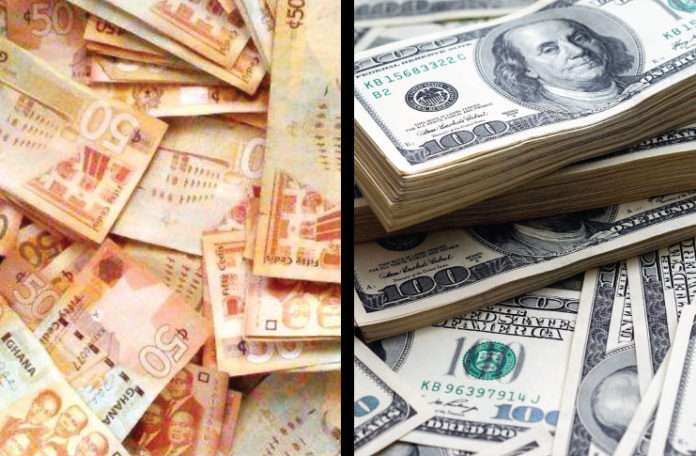Analysts are projecting a stable and positive outlook of the cedi, following the recent successful finalization of agreements between government and some key stakeholders like the Ghana Association of Banks (GAB) and the Ghana Insurance Association (GIA).
According to these analysts, the participation of the stakeholders in the debt exchange programme will be a major boost for businesses and the economy at large, with the currency rising in value as the debt exchange program seeks to unlock and restore debt and financial sustainability.
As at the second week of January this year, the cedi had depreciated at about 12.7 percent based on the year-to-date record analysis, closing the period at GH¢13.10 to US$1 on the forex parallel market.
The cedi, however, was trading at GH¢12.34 as of Friday, January 27, 2023, down from GH¢12.9 at the end of the previous week, while the official Bank of Ghana (BoG) rate stood at GH¢10.6.
Both parties, the GAB and the GIA settled on similar terms with government for the debt exchange programme for domestic banks and insurance companies holding Ghana’s bonds.
Government made concessions, as it agreed on an amended deal to pay a five percent coupon on its bonds maturing this year, and nine percent on all other restructured debt.
AZA Finance, one of the analysts, in its most recent review of the market disclosed that despite the slight decline over the past week, it expects the debt deal for local banks to support the cedi in the coming days.
Nikita Yao Gbordzi, another analyst who is the head of Fixed Income Clearing Corporation (FICC) at Obsidian Achernar (OA) Markets and the head of Forex (FX) Interbank at Obisidian Acherner during an interview divulged his expectation for a fair degree of stability in the interim with a timely International Monetary Fund (IMF) deal and disbursement of the first tranche of US$3billion by end of quarter-one; which is likely to see the currency appreciate even further against the American greenback.
“Things have been a little quiet lately, especially for the interbank scene on account of lower demand due to the Chinese New Year. Also, we are not at the tail-end of the first quarter. When the multinationals seek to repatriate profits, it is a good thing for the market. Generally that these agreements have been reached, government will finally get the 80 percent participation rate. This will drive confidence even before the IMF’s disbursement happens.”
Nikita Yao Gbordz
Consequently, Mr. Gbordzi predicted that US$1 would oscillate between GH¢12 and GH¢13.5 over the next couple of weeks, breaching the GH¢14 mark only if the market senses a significant delay in arrival of the IMF money.
This comment was passed by Mr. Gbordzi as the US unit begun to lose steam globally, in part due to a 0.1 percent decline in the headline US consumer price index (CPI) for December, the first month-on-month decline in almost three years.
This has led to projections that the Federal Reserve will scale back on its tightening stance, with increases of no more than 25 basis points per meeting down from a 50-basis-point increase in December and 75 basis points which were common in 2022.
An added layer of support to the local currency is suspension of interest payments to foreign banks by government, resulting in some US$40.63million of interest due on the January 2026 maturity being saved for the country.
Already, the BoG has instituted a number of measures to minimise first-quarter pressure on the cedi, as it works with multinationals on ways to retain some of their profit in the country for longer periods.
“To boost the supply of foreign exchange to the economy, the Bank of Ghana is working collaboratively with mining firms, international oil companies and their bankers to purchase all foreign exchange arising from the voluntary repatriation of export proceeds from mining, and oil and gas companies. This will strengthen the central bank’s foreign exchange auctions.”
Governor of the BoG, Dr. Ernest Addison
Gold-for-Oil
Additionally, the local unit is expected to be bolstered on the back of the gold-for-oil policy, which will fundamentally change the nation’s balance of payments (BOP) as government is targeting to save about US$3billion in foreign exchange yearly from the barter policy.
Inevitably, this policy to some extent will impact positively on the domestic currency with its associated effects on fuel, electricity, water, transport and food prices.
For this reason, last week the BoG suspended the Bulk Oil Distribution Companies’ FX auction. Per the forex forward auction calendar for bulk oil distribution companies for first quarter of 2023, the BoG planned to offer them a total of US$200million, of which US$40million was to be issued in the first and second auction of January, and subsequently issue US$30million each auction to the end of first quarter.
Read Also : Africa’s GDP To Grow By 8.8% By 2050 If Its Well Performing Digital Economy Is Sustained – Ofori-Atta























